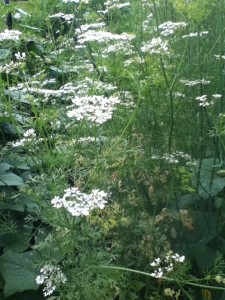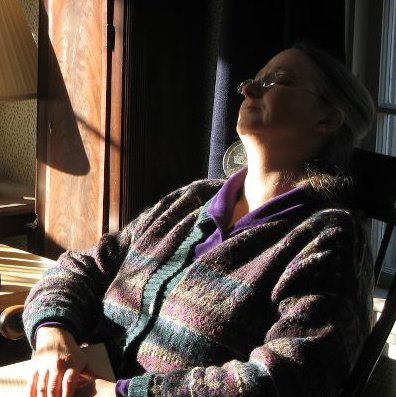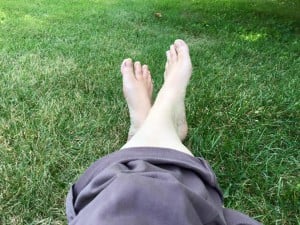I have a taste for gods and for cilantro.
So I was struck by a conversation David Dashifen Kees started recently. “Some people are colorblind,” he wrote. “Can people be god blind? I.e. Unable to see some or all types of deity? Discuss.”
I think Kees is onto something here. It seems to me that there are some real and profound differences hard-wired into us around how (and whether) we see Spirit in the world, and maybe whether we care to look into the subject at all.
Setting aside thoughts on how lots of people seem to substitute a blind adherence to a creed, and wave allegiance to it like a flag of loyalty, I think there are real differences in how humans are drawn to religious experience or not–and, among those who are drawn to the spiritual encounter, how we perceive it. With the exception of those who would turn Mystery into an excuse for a tribal loyalty test, I don’t think these differences are moral in nature. It seems as though they simply are.
I’m someone who trances easily; my husband does not. I’m someone who can’t get enough religious experience in my life; my family of origin have no use for it at all.
I attend a monthly meeting where many members seem demonstrably to be caught up in the same Mystery I am, and yet they are quite clear that the Light we wait upon is an encounter with the historical personage of Jesus. To me, it is an unpersonified yet intimate warm Presence. Still others, non-theist Quakers, doubt we are waiting upon anything more than the Light of our own human reason and compassion, and find even the use of supernatural language to be an offense against their integrity.
And yet, when we listen together for spiritual Unity, we often do find it… and when we speak from our experience of the Light, I can hear the same Spirit that I encounter resonating and alive in the messages of Christ-centered and non-theist Friends. When I listen “where the words come from,” I hear something I recognize.
Pagans perceive gods and many and distinct–or as emanations from a common Ground of All Being. Or we doubt the existence of gods entirely, and find many spirits, alive in infinite complexity in each individual rock, tree, mountain, or river. And too often, we judge one another on how we perceive the Mysteries around us.
But what if our differences in understanding are neither good nor bad, neither distortions of experience nor reflections of utterly different experiences, but simply how each of us has been allowed to get a brief glimpse of something that doesn’t fit into words at all?
I don’t know why some humans do not feel the same yearning for religious experience I do, but I entirely accept what atheists remind us of–that if you run around hurting people in life, you need more empathy, not more religion. I don’t know why it is that I find daily spiritual practice as vital to my life as I do kindness and friendship… but I do. Nor do I know why my daughter can’t go a day without music, or my husband a day without art, but I can… so long as I can curl up with a good book at the end of it (something they could happily skip).
 I find it easy to believe that we are different simply because we are made that way. But maybe color blindness is the wrong metaphor; maybe it’s more like the ways humans taste cilantro: some can’t stand it; some can take it or leave it; some love the flavor like nobody’s business. I’m in the last category, but it doesn’t make me “better” than the people who have the cilantro-tasting gene that makes the stuff taste like soap.
I find it easy to believe that we are different simply because we are made that way. But maybe color blindness is the wrong metaphor; maybe it’s more like the ways humans taste cilantro: some can’t stand it; some can take it or leave it; some love the flavor like nobody’s business. I’m in the last category, but it doesn’t make me “better” than the people who have the cilantro-tasting gene that makes the stuff taste like soap.
Or maybe it’s more like falling in love: a lot of people accept friends-with-benefits and a white wedding as a perfectly respectable substitute. Some people reject the concept entirely, and others churn their lives into disastrous chaos running after one perfect lover after another. (Their soul mate is always over the next hill…)
If my own life’s story is anything to judge by, however, there is indeed such a thing as true love–even if it can’t be weighed or measured or graphed. But can I claim to have earned it? That it implies I am a better person than those whose experience with love hasn’t lived up to our culture’s hype? Even I am not that arrogant.
I will admit, I would not want to live differently, in my spiritual or my romantic life. For myself, at least, I think of my own spiritual and romantic perceptions as “best,” in the sense that I wouldn’t want to trade with someone whose life story is different in those ways. But Can I take credit for the different spiritual insights I’ve been lucky enough to have had? Maybe–at least that I’ve been open to having them, to “tasting” them. But not, I think, to how they have tasted to me.
We are different from one another, and none of us is entirely self-created. Though much of human experience is universal, and there’s a lot of overlap, there are some ordinary and extraordinary differences, too.
It is my conviction that there is room for those differences: in how we love, how we understand Spirit… and even in how we taste cilantro.















